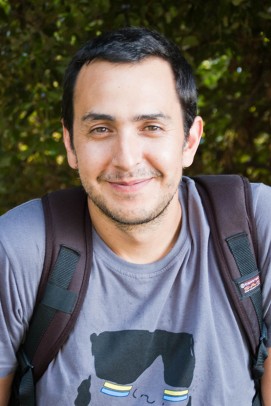Ig Nobel Prize-winning chicken-dinosaur study a UIC first
UIC researcher Jose Iriarte-Diaz traveled to Harvard University last week to be honored by Nobel Prize laureates — but it wasn’t exactly the Nobel Prize.
Iriarte-Diaz is among 10 national winners of the 2015 Ig Nobel Prize, given to researchers whose work makes you laugh, then think.
“Winning the prize was completely out of the blue,” said Iriarte-Diaz, assistant professor of oral biology in the College of Dentistry. “I’ve heard of the award and watched the ceremony on TV before so I was very happy and flattered.”
Iriarte-Diaz won the Biology Prize for his research on dinosaur movement, which involved attaching a fake tail to chickens to observe how it affected their gait.

“I’m very happy that people are paying attention, one way or another,” says Jose Iriarte-Diaz of his IgNobel Prize.
“We don’t have dinosaurs, so this is one of the best things that we have,” he said. “Birds are derived from dinosaurs. There’s been many, many changes from dinosaurs to birds but one of the most important is that they lost their tails, which produced a change in the center of mass. It’s an interesting approach to a very difficult problem.”
Studying a group of 12 domestic chickens, Iriarte-Diaz used modeling clay to attach a tail — a wooden stick — to the chickens two days after hatching. He changed the tail every five days as the chickens grew, then compared their movements to his control subjects, chickens without tails.
His research suggests that dinosaurs walked more like humans, with a vertical stance and most of the movement in the hips. Chickens without the experimental tails showed more horizontal movements, with the knees doing most of the work.
Iriarte-Diaz conducted his research about 10 years ago in Chile, but didn’t publish it until 2014 in the journal PLOS ONE. His current research at UIC focuses on the biomechanics of feeding and the evolution of the craniofacial system in mammals.
He was happy to travel to the celebration at Harvard Sept. 17 to pick up his prize, which came with a $10 trillion banknote from Zimbabwe, worth about $0.04. The ceremony can be viewed online at (his award is presented at about 1:12).
“It was a very interesting night of science and funny things and people enjoying what they do and promoting their research,” he said. “I’m very happy that people are paying attention, one way or another.”
